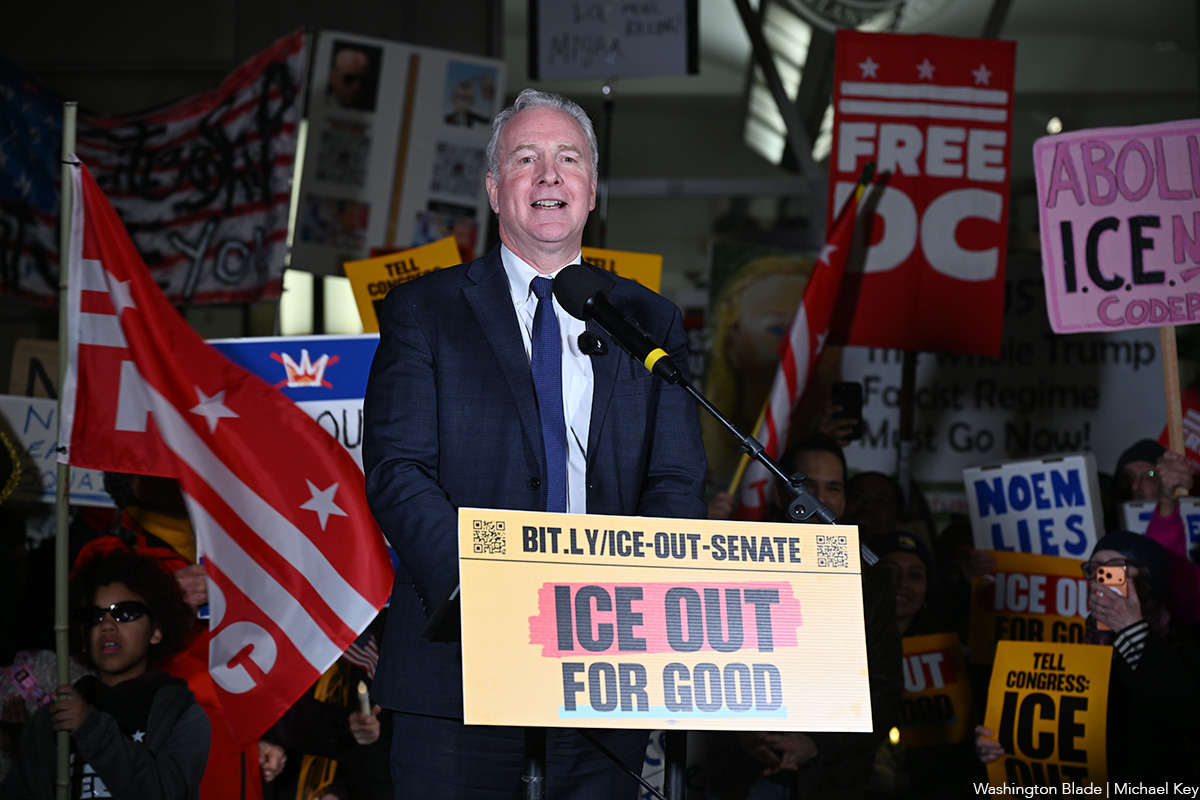Politics
OPM lays out post-DOMA plan for fed’l employee benefits
Health, pension, dental and life insurance benefits available immediately


U.S. Office of Personnel Management has instituted new guidance for married gay federal employees in the wake of the DOMA court ruling. (photo public domain)
Gay federal employees in legal same-sex marriages will be eligible immediately for health and pension benefits in the aftermath of the Supreme Court ruling against Section 3 of the Defense of Marriage Act, according to a new memo from the U.S. Office of Personnel Management.
The memorandum, dated June 28 and signed by OPM acting director Elaine Kaplan, identifies five new areas of benefits that will be available after the court decision for the legal spouses as well as newly qualified children and stepchildren of gay federal employees.
“There are numerous benefits that are affected by the Supreme Court’s decision, and it is impossible to answer every question that you might have,” Kaplan, a lesbian, writes. “Nevertheless, I want to assure you that the U.S. Office of Personnel Management is committed to working with the Department of Justice to ensure swift and seamless implementation of the court’s ruling.”
The five new benefits identified in the memo are:
• health insurance through the Federal Health Employees Benefits (FEHB) plan;
• life insurance through the Federal Employees’ Group Life Insurance (FEGLI) program;
• dental and vision insurance through the Federal Employee Dental and Vision Insurance Program (FEDVIP);
• long-term care insurance under the Federal Long Term Care Insurance Program (FLTCIP);
• retirement benefits;
• and the ability to submit claims for medical expenses through flexible spending accounts.
For each of the four insurance benefits in the memo, gay federal employees must elect to make a change within the window of 60 days between June 26, 2013 and August 26, 2013 to enroll. With respect to health, dental and vision insurance, the next opportunity would be at the start of open season later this year.
For employees who already have health coverage under a FEHB plan, coverage will begin immediately. For those who don’t, benefits will be effective on the first day of the first pay period after the enrollment request is received.
To be eligible for retirement benefits for their same-sex spouses, gay federal employees have two years until after the Supreme Court decision, or June 26, 2015, to inform OPM they have a legal marriage that qualifies for recognition and elect and changes to benefits.
The OPM memo is the first of many pieces of guidance expected from federal agencies in the wake of the Supreme Court’s decision to strike down the Defense of Marriage Act. After the court ruling, President Obama said he instructed U.S. Attorney Eric Holder to work with other Cabinet members to implement the end to the Defense of Marriage Act.
In a statement, Obama called the OPM guidance “a critical first step” toward implementing the Supreme Court ruling that determined “all married couples should be treated equally under federal law.”
“Thousands of gays and lesbians serve our country every day in the federal government,” Obama said. “They, and their spouses and children, deserve the same respect and protection as every other family.”
In another statement, Holder said the Obama administration by offering these benefits “is making real the promise of this important decision” against DOMA, but there’s more to come.
“As the President directed, the Department of Justice will continue to coordinate with other federal agencies to implement this ruling as swiftly and smoothly as possible,” Holder said. “I look forward to sharing additional information as it becomes available. We will never stop fighting to ensure equality, opportunity, and – above all – justice for everyone in this country.”
Leonard Hirsch, a board member for the LGBT federal employee affinity group known as Federal GLOBE, called the guidance “an extraordinary result” for everyone’s who been working on the issue for decades.
“It opens up the key benefits that key benefits for federal employees that have been closed — health insurance, life insurance — to the same-sex spouses of federal employees and retirees,” Hirsch said.
Hirsch also emphasized the word must to get out to federal retirees that their same-sex spouses are eligible for federal benefits in the wake of the ruling against DOMA.
“This was included, so this is a wonderful, inclusive set of changes that OPM has been preparing for and announced today,” Hirsch said.
Thomas Richards, an OPM spokesperson, confirmed that the guidance applies to all employees in legal same-sex marriages — even those that live in states that don’t recognize marriage equality.
“These benefits will be available to any federal employee or annuitant who has a valid marriage license, regardless of their state of residency,” Richards said.
But the guidance doesn’t cover federal employees in same-sex relationships who aren’t married, such as those in domestic partnerships or civil unions. In July, gay Rep. Mark Pocan (D-Wis.) is expected to introduce the legislation known as the Domestic Partnership Benefits & Obligations Act to address this issue.
Richards noted the limitations of the new guidance is restricted to legally married federal employees, but recalled a 2009 memorandum from President Obama that offered limited benefits to employees in civil unions or domestic partnerships
“Acting Director Kaplan’s memo identifies certain benefits previously available only to opposite-sex spouses that are now available to all legally married spouses, including same-sex spouses,” Richards said. “OPM has already extended benefits to same-sex domestic partners to the extent permissible under the law.”
Congress
McBride, other US lawmakers travel to Denmark
Trump’s demand for Greenland’s annexation overshadowed trip

Delaware Congresswoman Sarah McBride is among the 11 members of Congress who traveled to Denmark over the past weekend amid President Donald Trump’s continued calls for the U.S. to take control of Greenland.
McBride, the first openly transgender person elected to Congress, traveled to Copenhagen, the Danish capital, with U.S. Sens. Chris Coons (D-Del.), Thom Tillis (R-N.C.), Jeanne Shaheen (D-N.H.), Dick Durbin (D-Ill.), and Lisa Murkowski (R-Alaska) and U.S. Reps. Steny Hoyer (D-Md.), Gregory Meeks (D-N.Y.), Madeleine Dean (D-Pa.), Don Bacon (R-Neb.), and Sarah Jacobs (D-Calif.). The lawmakers met with Danish Prime Minister Mette Frederiksen and Greenlandic MP Pipaluk Lynge, among others.
“I’m grateful to Sen. Coons for his leadership in bringing together a bipartisan, bicameral delegation to reaffirm our support in Congress for our NATO ally, Denmark,” said McBride in a press release that detailed the trip. “Delaware understands that our security and prosperity depend on strong partnerships rooted in mutual respect, sovereignty, and self-determination. At a time of growing global instability, this trip could not be more poignant.”
Greenland is a self-governing territory of Denmark with a population of less than 60,000 people. Trump maintains the U.S. needs to control the mineral-rich island in the Arctic Ocean between Europe and North America because of national security.
The Associated Press notes thousands of people on Saturday in Nuuk, the Greenlandic capital, protested against Trump. British Prime Minister Keir Starmer is among those who have criticized Trump over his suggestion the U.S. would impose tariffs against countries that do not support U.S. annexation of Greenland.
A poll that Sermitsiaq, a Greenlandic newspaper, and Berlingske, a Danish newspaper, commissioned last January indicates 85 percent do not want Greenland to become part of the U.S. The pro-independence Demokraatit party won parliamentary elections that took place on March 12, 2025.
“At this critical juncture for our countries, our message was clear as members of Congress: we value the U.S.-Denmark partnership, the NATO alliance, and the right of Greenlanders to self-determination,” said McBride on Sunday in a Facebook post that contained pictures of her and her fellow lawmakers meeting with their Danish and Greenlandic counterparts.
Congress
Van Hollen speaks at ‘ICE Out for Good’ protest in D.C.
ICE agent killed Renee Nicole Good in Minneapolis on Jan. 7

U.S. Sen. Chris Van Hollen (D-Md.) is among those who spoke at an “ICE Out for Good” protest that took place outside U.S. Customs and Border Protection’s headquarters in D.C. on Tuesday.
The protest took place six days after a U.S. Immigration and Customs Enforcement agent shot and killed Renee Nicole Good, a 37-year-old woman in Minneapolis.
Good left behind her wife and three children.
(Video by Michael K. Lavers)
Congress
Advocates say MTG bill threatens trans youth, families, and doctors
The “Protect Children’s Innocence” Act passed in the House

Georgia Congresswoman Marjorie Taylor Greene has a long history of targeting the transgender community as part of her political agenda. Now, after announcing her resignation from the U.S. House of Representatives, attempting to take away trans rights may be the last thing she does in her official capacity.
The proposed legislation, dubbed “Protect Children’s Innocence Act” is among the most extreme anti-trans measures to move through Congress. It would put doctors in jail for up to 10 years if they provide gender-affirming care to minors — including prescribing hormone replacement therapy to adolescents or puberty blockers to younger children. The bill also aims to halt gender-affirming surgeries for minors, though those procedures are rare.
Greene herself described the bill on X, saying if passed, “it would make it a Class C felony to trans a child under 18.”
According to KFF, a nonpartisan source for health policy research, polling, and journalism, 27 states have enacted policies limiting youth access to gender-affirming care. Roughly half of all trans youth ages 13–17 live in a state with such restrictions, and 24 states impose professional or legal penalties on health care practitioners who provide that care.
Greene has repeatedly introduced the bill since 2021, the year she entered Congress, but it failed to advance. Now, in exchange for her support for the National Defense Authorization Act, the legislation reached the House floor for the first time.
According to the 19th, U.S. Rep. Sarah McBride (D-Del.), the first trans member of Congress, rebuked Republicans on the Capitol steps Wednesday for advancing anti-trans legislation while allowing Affordable Care Act tax credits to expire — a move expected to raise health care costs for millions of Americans.
“They would rather have us focus in and debate a misunderstood and vulnerable one percent of the population, instead of focusing in on the fact that they are raiding everyone’s health care,” McBride said. “They are obsessed with trans people … they are consumed with this.”
Polling suggests the public largely opposes criminalizing gender-affirming care.
A recent survey by the Human Rights Campaign and Global Strategy Group found that 73 percent of voters in U.S. House battleground districts oppose laws that would jail doctors or parents for providing transition-related care. Additionally, 77 percent oppose forcing trans people off medically recommended medication. Nearly seven in 10 Americans said politicians are not informed enough to make decisions about medical care for trans youth.
The bill passed the House and now heads to the U.S. Senate for further consideration.
According to reporting by Erin Reed of Erin In The Morning, three Democrats — U.S. Reps. Henry Cuellar and Vicente Gonzalez of Texas and Don Davis of North Carolina — crossed party lines to vote in favor of the felony ban, joining 213 Republicans. A total of 207 Democrats voted against the bill, while three lawmakers from both parties abstained.
Advocates and lawmakers warned the bill is dangerous and unprecedented during a multi-organizational press call Tuesday. Leaders from the Human Rights Campaign and the Trevor Project joined U.S. Rep. Becca Balint (D-Vt.), Dr. Kenneth Haller, and parents of trans youth to discuss the potential impact of restrictive policies like Greene’s — particularly in contrast to President Donald Trump’s leniency toward certain criminals, with more than 1,500 pardons issued this year.
“Our MAGA GOP government has pardoned drug traffickers. They’ve pardoned people who tried to overthrow the government on January 6, but now they want to put pediatricians and parents into a jail cell for caring for their kids,” said Human Rights Campaign President Kelley Robinson. “No one asked for Marjorie Taylor Greene or Dan Crenshaw or any politician to be in their doctor’s office, and they should mind their own business.”
Balint, co-chair of the Congressional Equality Caucus, questioned why medical decisions are being made by lawmakers with no clinical expertise.
“Parents and doctors already have to worry about state laws banning care for their kids, and this bill would introduce the risk of federal criminal prosecution,” Balint said. “We’re talking about jail time. We’re talking about locking people up for basic medical care, care that is evidence-based, age-appropriate and life-saving.”
“These are decisions that should be made by doctors and parents and those kids that need this gender-affirming care, not certainly by Marjorie Taylor Greene.”
Haller, an emeritus professor of pediatrics at St. Louis University School of Medicine, described the legislation as rooted in ideology rather than medicine.
“It is not science, it is just blind ideology,” Haller said.
“The doctor tells you that as parents, as well as the doctor themselves, could be convicted of a felony and be sentenced up to 10 years in prison just for pursuing a course of action that will give your child their only chance for a happy and healthy future,” he added. “It is not in the state’s best interests, and certainly not in the interests of us, the citizens of this country, to interfere with medical decisions that people make about their own bodies and their own lives.”
Haller’s sentiment is echoed by doctors across the country.
The American Medical Association, the nation’s largest organization that represents doctors across the country in various parts of medicine has a longstanding support for gender-affirming care.
“The AMA supports public and private health insurance coverage for treatment of gender dysphoria and opposes the denial of health insurance based on sexual orientation or gender identity,” their website reads.
Rodrigo Heng-Lehtinen, senior vice president of public engagement campaigns at the Trevor Project, agreed.
“In Marjorie Taylor Greene’s bill [it] even goes so far as to criminalize and throw a parent in jail for this,” Heng-Lehtinen said. “Medical decisions should be between patients, families, and their doctors.”
Rachel Gonzalez, a parent of a transgender teen and LGBTQ advocate, said the bill would harm families trying to act in their children’s best interests.
“No politician should be in any doctor’s office or in our living room making private health care decisions — especially not Marjorie Taylor Greene,” Gonzalez said. “My daughter and no trans youth should ever be used as a political pawn.”
Other LGBTQ rights activists also condemned the legislation.
Tyler Hack, executive director of the Christopher Street Project, called the bill “an abominable attack on the transgender community.”
“Marjorie Taylor Greene’s last-ditch effort to bring her 3-times failed bill to a vote is an abominable attack on the transgender community and further cements a Congressional career defined by hate and bigotry,” they said. “We are counting down the days until she’s off Capitol Hill — but as the bill goes to the floor this week, our leaders must stand up one last time to her BS and protect the safety of queer kids and medical providers. Full stop.”
Hack added that “healthcare is a right, not a privilege” in the U.S., and this attack on trans healthcare is an attack on queer rights altogether.
“Marjorie Taylor Greene has no place in deciding what care is necessary,” Hack added. “This is another attempt to legislate trans and queer people out of existence while peddling an agenda rooted in pseudoscience and extremism.”
U.S. Rep. Mark Takano (D-Calif.), chair of the Congressional Equality Caucus, also denounced the legislation.
“This bill is the most extreme anti-transgender legislation to ever pass through the House of Representatives and a direct attack on the rights of parents to work with their children and their doctors to provide them with the medical care they need,” Takano said. “This bill is beyond cruel and its passage will forever be a stain on the institution of the United States Congress.”
The bill is unlikely to advance in the Senate, where it would need 60 votes to pass.



















